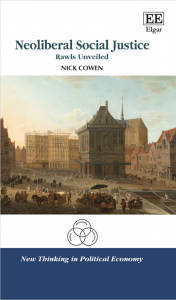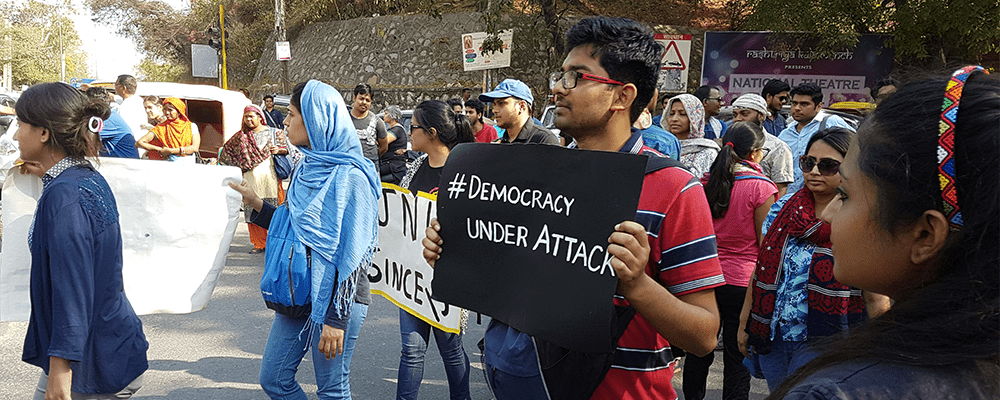Authoritarianism, Borders and Glocalization: a Politics of Disorder book launch
On Wednesday 8 March, the Politics of Disorder research group at the University of Lincoln is hosting a book launch of recently published works which focus on contemporary ordering and disordering of the political. The event will take place in the Co-op lecture theatre, Minerva Building between 6-8pm and all are welcome.
Professor Rico Isaacs will speak on his recently published book, Political Opposition in Authoritarianism Exit, Voice and Loyalty in Kazakhstan (Palgrave Macmillian, 2022). The book examines how the emergence of political opposition in Kazakhstan shaped the dynamics of authoritarian regime development in Kazakhstan, culminating in the political disorder of bloody violent events of January 2022.
Dr Mike Slaven will speak on his recently published book, Securing Borders, Securing Power: the Rise and Decline of Arizona’s Border Politics (Columbia University Press, 2022). In exploring the case politics on the US-Mexico border, Dr Slaven will unpack how politicians strategise about border and immigration politics and why the securitisation of migration spreads across the political spectrum.
Professor Christian Karner will speak on his new book, Sociology in Times of Glocalization (Anthem Press, 2022). Professor Karner’s book examines the many ways in which the global impacts our local lives and often triggers powerful counter-reactions, and how such ‘glocalization’ is leading sociologists to recalibrate some of their methodological approaches and key concepts
Each speaker will give a short talk about their respective books followed by a Q&A followed by a wine reception. The event will be chaired by Professor Gary Rawnsley, Head of the School of Social and Political Sciences.
The live stream will be available to view here: https://www.youtube.com/watch?v=M3ktQ4cBehI
Previous Events:
-
The Politics of Disorder is happy to be co-organising a workshop with Adam Mickiewicz University in Poznań, The Faculty of Polish and Classical Philology, The Institute of Film, Media and Audiovisual Arts, and The McLuhan Centre For Communication, on Contradictory Modernities? (Neo-)Romanticism, Inter-Group Politics and Nostalgia across Central Europe, January 23rd and 24th 2023
The point of departure and backdrop to this workshop was a joint publication by the two organizers (Karner and Kazmierczak 2017), which demonstrated the “palimpsest-like overwriting” and retailoring of select features of romantic thought in the service of neonationalist politics in both Poland and Austria. This workshop intends to significantly broaden the issues first raised in the article in question historically, geographically and conceptually. More specifically, we will bring together a group of eminent scholars with different disciplinary backgrounds and diverse empirical/ historical expertise to examine the contradictory workings of modernization and various counter-reactions across Central Europe and across the longue durée. The list of questions to be addressed through a series of papers and ensuing discussions will include, but not be limited to, the following:1) How plausible is the common juxtaposition of (neo-)romanticism to the Enlightenment, in which the former is constructed as a purported reaction against the latter?2) Conversely, might we need to rethink Central European modernities in more nuanced terms, which then allow us to extrapolate a series of distinctive shifts that jointly constituted modernization (e.g. industrialization, democratization, bureaucratization, imperialism and post-imperialism, urbanization, nation-building)? Might this in turn lead to a (re)conceptualization of Central European modernities as intrinsically contested epochs and as co-defined by diametrically opposed political vectors pushing in the directions of, for instance, universalism and particularism, or emancipation and social closure?3) What have been the significance, role and manifestations of inter-group politics in the course of different Central European routes through 19th and 20th century modernization?4) What role have nostalgic memory politics played across a range of cultural-artistic, social and political domains? This will here include critical readings of select depictions of Heimat (/ homeland) in art and visual culture (e.g. in relation to tourism) during the 20th and 21st centuries.5) Can contemporary neo-nationalisms across Central Europe be read as manifestations of neo-romanticism? If so, what are their continuities with earlier forms of reactionary romanticism?6) How are we to make sense of contemporary forms of esotericism, far-right protest politics and “philosophical irrationalism” (Luft 2003), as they have crystallized in, for instance, “anti-vaxxer” movements?7) How do memories and traces of Central Europe’s contradictory modernities feature in popular culture and social media today?8) For a more comprehensive, longue durée and regionally comparative understanding of Central European experiences of modernity, which methodological approaches, documentary/ discursive materials, and inter-disciplinary synergies are promising to be most helpful?To explore these and similar questions, we will draw on and collaborate across multiple disciplines in the social sciences and humanities (i.e. history, sociology, philosophy, cultural studies, art history). Our conference will take place at Adam Mickiewicz University in Poznań on January 23 and 24, 2023.Confirmed speakers include (in alphabetical order): Professor Jan Balon, Centre for Science and Technology and Society Studies of the Institute for Philosophy at the Czech Academy of Science. Dr. Michael Burri, Bryn Mawr, current president of the Austrian Studies Association. Dr. Tim Corbett, historian and independent scholar, Vienna. Professor John Holmwood, Professor Emeritus, University of Nottingham and Senior Researcher in the Centre for Science and Technology and Society Studies of the Institute for Philosophy at the Czech Academy of Science. Professor Maciej Junkiert, Adam Mickiewicz University Poznan. Professor David Luft, Horning Endowed Chair in the Humanities (Emeritus) at Oregon State University. Professor Christian Karner, Professor of Sociology, University of Lincoln. Professor Marek Kazmierczak, Adam Mickiewicz University Poznań. Dr. Jernej Kosi, University of Ljubljana. Professor Laura Morowitz, Wagner College, USA. Dr. Béla Rásky, University of Vienna. Dr. Julia Secklehner, art historian, Masaryk University.Click the link below to join the live stream:Please note that to join the live stream you will need to click on “online transmission” to the right (of the conference homepage). Also, the programme are CET, so one hour ahead of the UK. -
Politics of Disorder Research Group Inaugural Lecture
Monday 30th May 12:00 to 13:30pm, Bridge House BH0101, the University of Lincoln
Forging ‘permanent order’ from disorder in the Peoples Republic of China: national (in)security, frontier genocide, state terror and a sanctioned academic
Jo Smith Finley, University of NewcastleIn the very first inaugural lecture for the Politics of Disorder research group, Dr Jo Smith Finley will be giving an overview of her research on the Uyghur population in Xinjiang in Western China and their struggle against securitisation, human rights violations, and terror of the Chinese state, as well as her experience of being one of nine UK citizens sanctioned by the Chinese government.
Joanne Smith Finley joined Newcastle University in January 2000, where she is Reader in Chinese Studies. Her research interests have included the evolution of identities among the Uyghurs of Xinjiang, NW China, and in the Uyghur diaspora; strategies of symbolic resistance in Xinjiang; Uyghur women between Islamic revival and Chinese state securitization of religion; PRC counter-terrorism measures in Xinjiang as state terror; and political “re-education” in Xinjiang as (cultural) genocide. She is author of “Why Scholars and Activists Increasingly Fear a Uyghur Genocide in Xinjiang,” Journal of Genocide Research, 2020 (DOI: 10.1080/14623528.2020.1848109), "Securitization, Insecurity and Conflict in Contemporary Xinjiang: Has PRC Counter-Terrorism Evolved into State Terror?" Central Asian Survey, 2019 (DOI: 10.1080/02634937.2019.1586348), and The Art of Symbolic Resistance: Uyghur Identities and Uyghur-Han Relations in Contemporary Xinjiang (Brill Academic Publishing, 2013); and co-editor of Language, Education and Uyghur Identity in Urban Xinjiang (Routledge, 2015) and Situating the Uyghurs Between China and Central Asia (Ashgate, 2007). Based on her three decades of expertise in Uyghur studies, she writes occasional op-eds for the international media (https://www.chinafile.com/reporting-opinion/viewpoint/now-we-dont-talk-anymore) and gives frequent interviews to investigative journalists, documentary filmmakers, and radio and television broadcasters. She serves as expert country witness in Uyghur asylum cases in the UK, Europe, the US and Canada, and advises legal firms, refugee support organizations, government departments, non-governmental organizations and think tanks.
-
Virtual Roundtable – ‘Russia's war of aggression in Ukraine: regional perspectives from the Baltic Republics, Central Asia and China
Friday 11th March 2022 – Watch HERE
-
The Politics of Disorder in conjunction with the School of Social and Political Sciences research seminar series presents Dr Filippo Menga from the University Bergamo who will provide a talk on ‘Populist Ecologies’.
Wednesday 23 February 2022 on MS Teams – Watch HERE
Populist Ecologies
ABSTRACT: Right-wing variants of populism are on the rise across the globe, creating new patterns of interaction between society and the environment. These new socio-ecological relationships – dubbed ‘populist ecologies’ – are not homogenous and, instead, can vary from country to country and populist to populist. In this presentation, I will explore two particular right-wing populist ecologies: the government of Jair Bolsonaro in Brazil (2019 onwards) and the politics of Matteo Salvini in Italy. In doing so, I will highlight the complexity of the relationship between contemporary right-wing populism and the environment – and the ways in which populist ecologies may act to conceal the more-nefarious elements of the populist moment.
BIO: Filippo Menga is Associate Professor of Geography at the University of Bergamo, Italy. His research draws on political ecology, political geography, and critical geography to advance an innovative approach to the study of water politics, particularly in relation to hydraulic infrastructure and water charities, global water networks and governance, and the dialectics of sustainability. He has published articles on these topics in a wide range of academic journals and is Associate Editor of Political Geography. -
Politics of Disorder (PoD) Research Group Book Launch
16 February 2022, 1pm.
The University of Lincoln’s Politics of Disorder Research Group is happy to announce its first book launch event. Dr Nick Cowen and Dr. Sureyya Sonmez Efe will be presenting their recently published books Neoliberal Social Justice: Rawls Unveiled (Edward Elgar, 2021) and Rights of Migrant Workers: An Analysis of Migration Policies in Contemporary Turkey (Transnational Press, 2021). Please join us for what will be a fascinating discussion! Details of the speakers and books below: Dr. Nick Cowen, Senior Lecturer in Criminology
 Neoliberal Social Justice: Rawls Unveiled
Neoliberal Social Justice: Rawls Unveiled This timely and provocative book challenges the conventional wisdom that neoliberal capitalism is incompatible with social justice. Employing public choice and market process theory, Nick Cowen systematically compares and contrasts capitalism with socialist alternatives, illustrating how proponents of social justice have decisive reasons to opt for a capitalism guided by neoliberal ideas. The publisher has provided a 50 % discount when purchased from their website https://www.e-elgar.com/shop/gbp/neoliberal-social-justice-9781800374539.html Discount code: NCOW50
 Rights of Migrant Workers: An Analysis of Migration Policies in Contemporary Turkey
Rights of Migrant Workers: An Analysis of Migration Policies in Contemporary Turkey Dr. Sureyya Sonmez Efe This insightful book discusses how policymakers define migrant workers’ status and rights at international and national levels. Assessing the evolution of the language of rights for migrant workers in international law; definition of migrant workers in Turkish legislation; key political and economic factors on Turkish migration policies; protection mechanisms that safeguard migrant workers’ rights, it critically examines the policymaking processes at international, regional and national levels and evaluates the impact of the ‘values’ such as universal or ethnocentric values, on the definitions of status and rights of migrant workers. The publisher has provided a 30% discount for the book when purchased from their website https://www.tplondon.com/product/ Discount code: tpl*efe*2022
